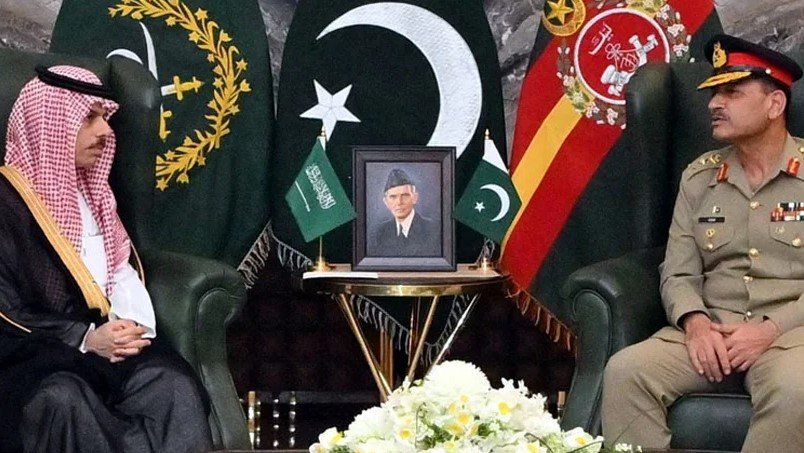Pakistan’s Chief of Army Staff Field Marshal Asim Munir met with Jordan’s King Abdullah II on October 27, 2025, during an official visit to Amman, where both sides pledged to boost defence and security cooperation. This high level talk highlights the growing military partnership between the two nations amid regional challenges, focusing on joint training, shared expertise, and strategies to address common threats.
Key Highlights from the Royal Meeting
Field Marshal Asim Munir, who leads Pakistan’s armed forces, held detailed discussions with King Abdullah II at the royal palace in Amman. The meeting included Crown Prince Hussein bin Abdullah II and aimed to expand ties in defence areas.
Both leaders shared views on regional security issues and expressed a strong will to work together more closely. Pakistan conveyed greetings from its people and government, while Jordan praised the role of Pakistani forces in maintaining peace.
The talk lasted for a key session, covering topics like military training programs and joint operations. This visit marks a step forward in relations that have grown over years through shared cultural and faith based bonds.
Officials from both sides noted the positive tone of the meeting, which built on past interactions between the two countries.

Focus on Defence and Security Cooperation
The core of the discussions centered on deepening defence ties, with plans to share military knowledge and improve joint strategies. Pakistan and Jordan aim to tackle shared threats like terrorism and instability in the Middle East and South Asia.
Field Marshal Munir reaffirmed Pakistan’s commitment to stronger fraternal relations, rooted in mutual respect. King Abdullah II, as supreme commander of Jordan’s armed forces, highlighted the need for more collaboration in security policies.
This partnership could lead to new agreements on equipment sharing and intelligence exchange. Recent global events, such as rising tensions in the region, make this cooperation timely and vital.
Experts see this as part of Pakistan’s broader outreach to Middle Eastern allies, following similar visits to Saudi Arabia and other nations in 2025.
Both countries have a history of military exchanges, and this meeting sets the stage for future joint exercises.
Praise for Pakistan’s Role in Regional Peace
King Abdullah II commended the professionalism of Pakistan’s armed forces and their contributions to regional stability. He noted Pakistan’s efforts in counter terrorism operations and peacekeeping missions worldwide.
Field Marshal Munir thanked the king for his support and stressed the importance of unity among Muslim nations. This praise comes at a time when Pakistan has increased its involvement in international security forums.
Jordan recognized Pakistan’s sacrifices in fighting extremism, which aligns with its own security priorities. The meeting also touched on how both nations can support each other in global forums.
Such acknowledgments boost morale and open doors for more aid and training programs between the two militaries.
Broader Implications for Bilateral Relations
This visit extends beyond defence, touching on economic and diplomatic ties. Pakistan and Jordan have seen increased trade in recent years, with defence deals potentially leading to broader partnerships.
In 2025, global defence spending has risen due to ongoing conflicts, making alliances like this crucial. Data shows Middle Eastern countries are investing more in security pacts.
Here is a quick look at recent defence cooperation trends between similar nations:
- Joint military exercises have grown by 15 percent in the region over the past year.
- Intelligence sharing agreements increased among allied countries.
- Training programs for officers from partner nations expanded in 2025.
| Aspect | Pakistan’s Contribution | Jordan’s Response |
|---|---|---|
| Counter Terrorism | Extensive operations in border areas | Praise for effective strategies |
| Peacekeeping | Troops in UN missions | Desire for joint UN roles |
| Military Training | Sharing expertise in urban warfare | Plans for exchange programs |
| Regional Stability | Support in Middle East forums | Commitment to mutual aid |
These elements show how the meeting could influence future policies.
The talks also align with Pakistan’s recent strategic moves, including pacts with other Gulf states earlier this year.
Future Prospects and Challenges Ahead
Looking forward, both nations plan to follow up with specific actions, such as joint drills and technology transfers. Challenges like geopolitical tensions could test this partnership, but shared goals provide a solid base.
Analysts predict more high level visits in 2026, building on this momentum. This could help both countries navigate complex regional dynamics.
In summary, the meeting signals a positive shift in Pakistan Jordan relations, with defence at the forefront.
What do you think about this growing alliance? Share your thoughts in the comments and spread the word to keep the conversation going.
